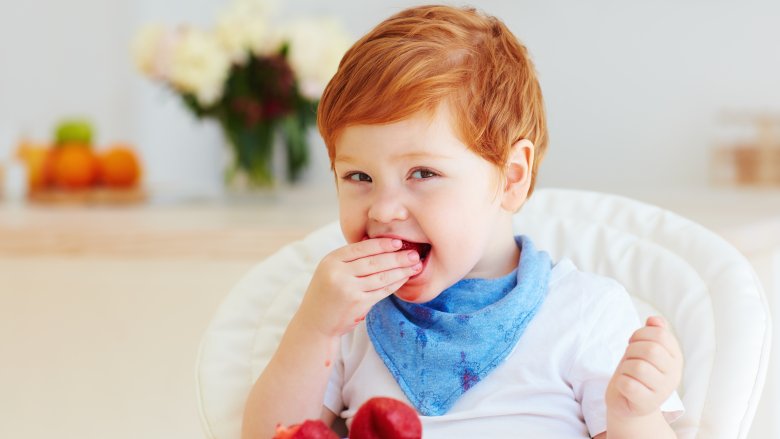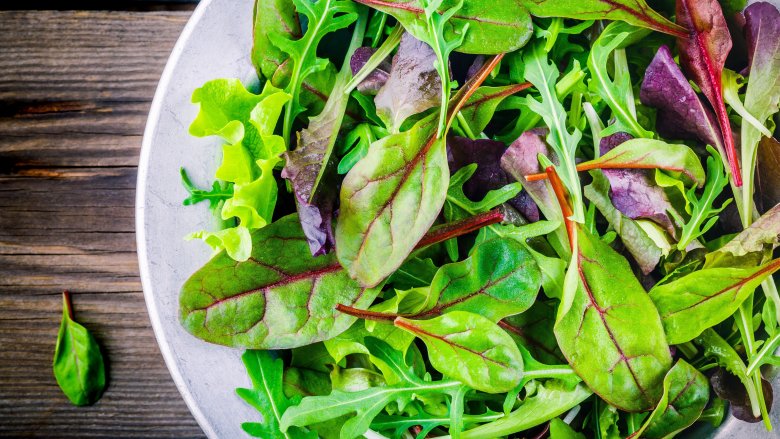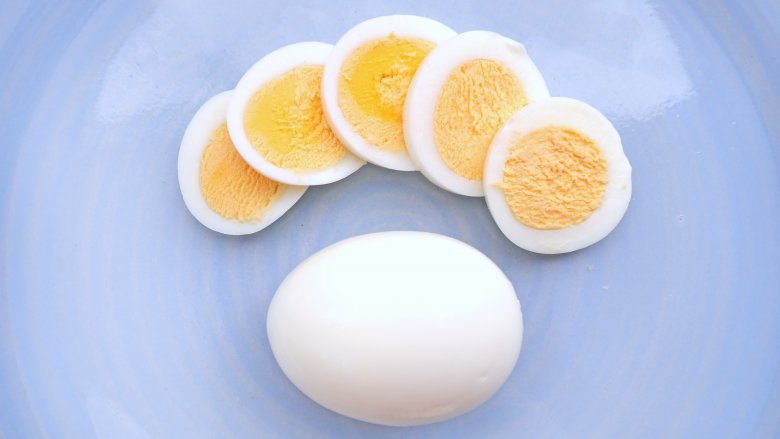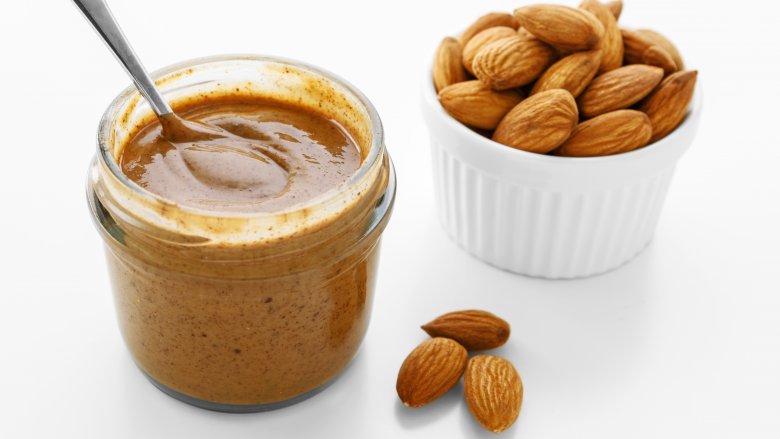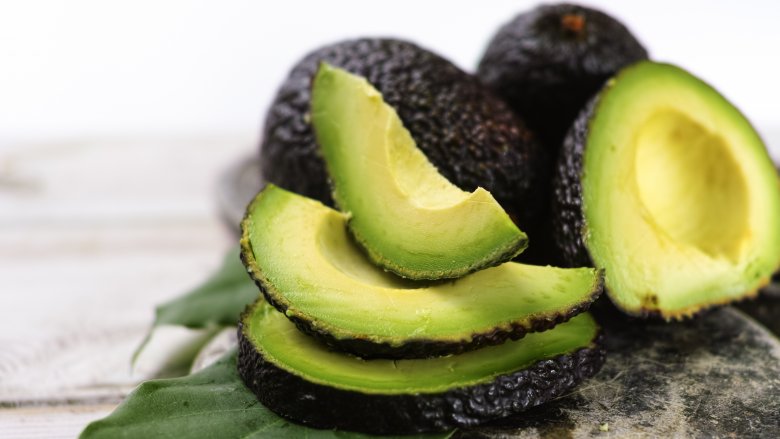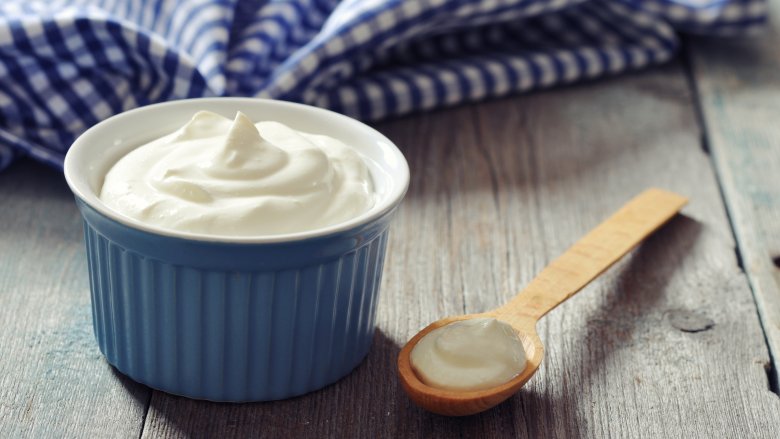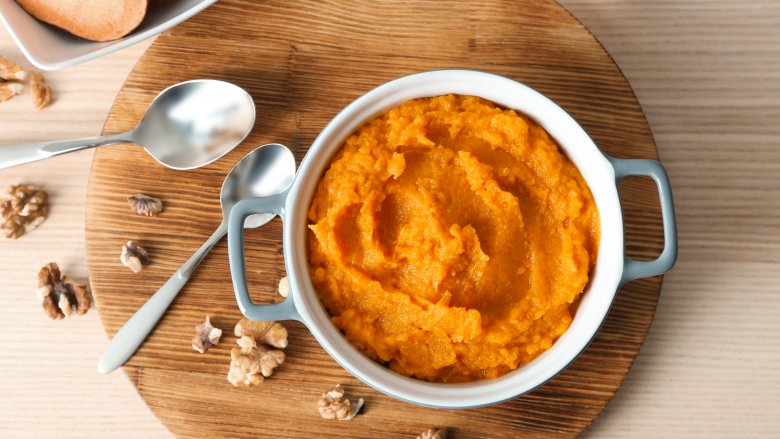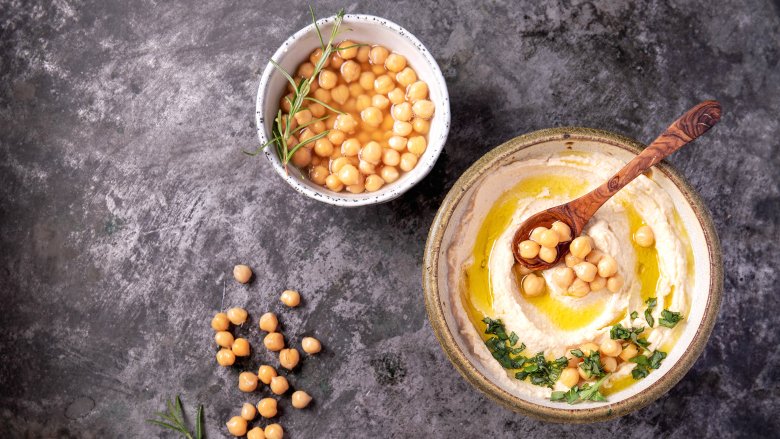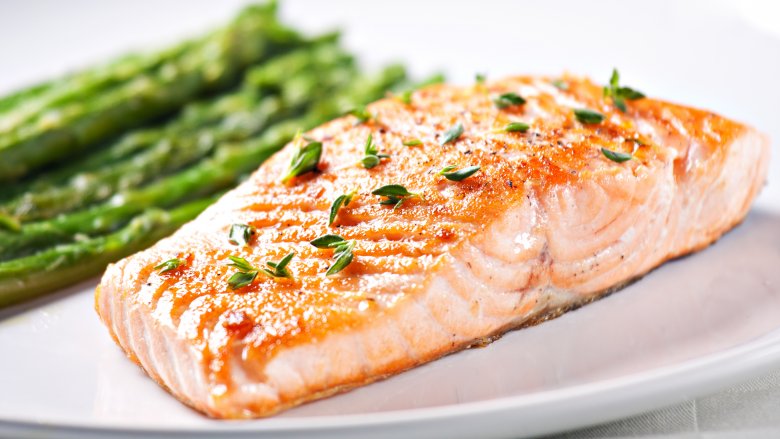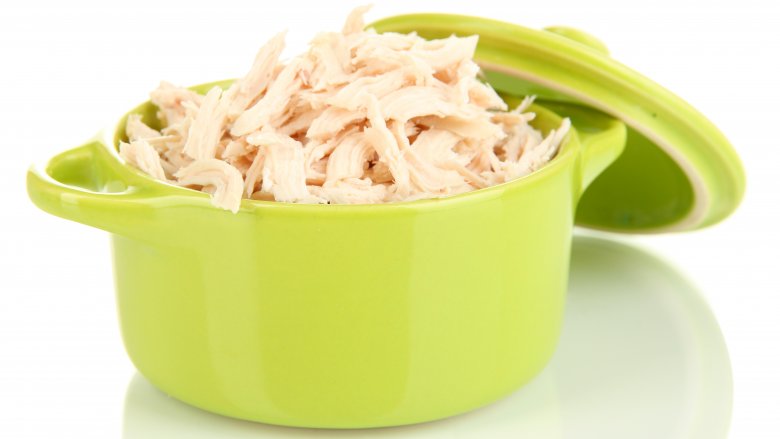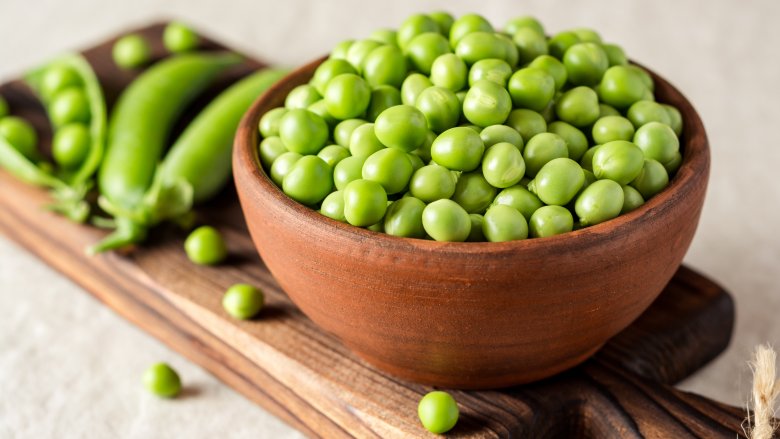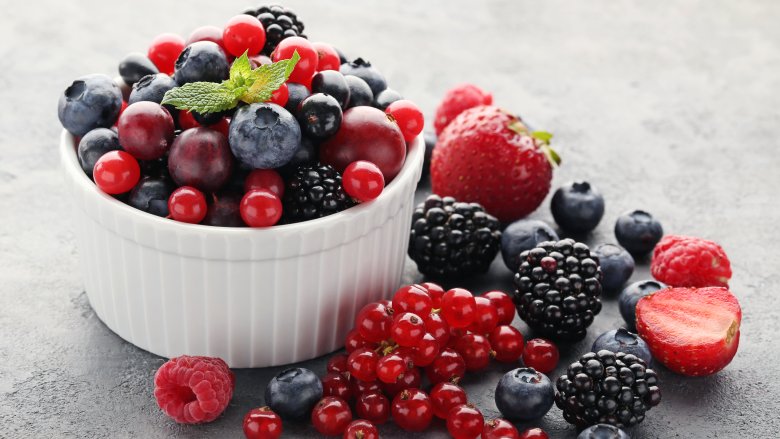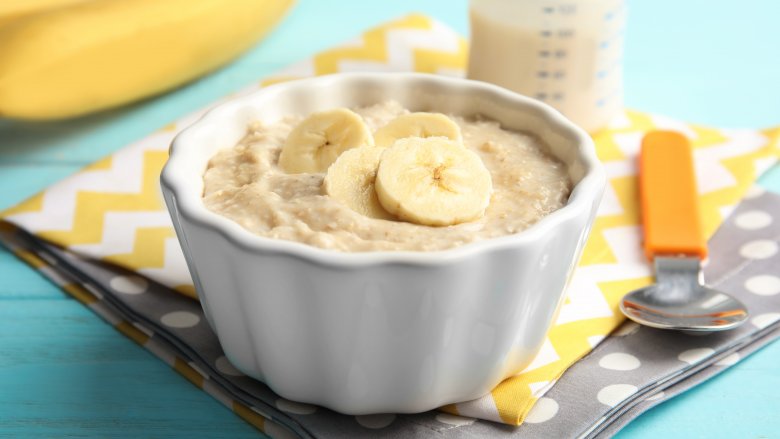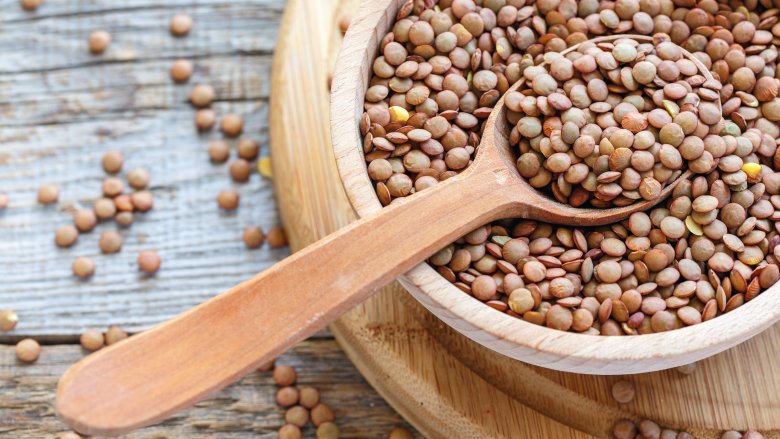The Best Foods For Baby Brain Growth
As a parent, it sometimes seems as though life can be summed up in two distinct spheres: the moment you welcome home your first bundle of joy, and everything that came before. Because the minute you find out you're having a baby, the best interest of your child informs the decisions you make moving forward.
Naturally, you want to do everything in your power to give your child the best head start possible and, fittingly, that starts with the head. Or, more precisely, your baby's brain, which undergoes vital development in those first few months of life. What your baby eats during those months can play a very important part in healthy brain development, so ensuring your child's diet includes certain key nutrients is paramount.
In an interview with Time, Dr. Sarah Jane Schwarzenberg, a member of the American Academy of Pediatrics' Committee on Nutrition, explained that, after breast milk, the best diet for babies is one that includes a variety of nutrient-rich foods. "The brains are developing at a rapid pace between one and two years, so we want pediatricians to be recommending a healthy spectrum of foods and not simply telling parents to give their baby certain foods," said Schwarzenberg.
In other words, no single food from the following list will provide your baby with all of the nutrients they need. But as part of a diverse and varied diet, the following foods are excellent for supporting your baby's brain growth.
Leafy green vegetables
You probably already know that leafy green vegetables like spinach, kale, Swiss chard and collard greens are good for you, right? But they're especially good for your baby's brain because they are rich in a specific brain-boosting nutrient called lutein. Per healthcare company Abbott Global, lutein serves as the main carotenoid in the brain related to memory, sensory skills, and learning.
A 2015 study published by the U.S. National Library of Medicine similarly addresses the importance of lutein's neuroprotective effects. "Given that brain viability is affected by the structural integrity and function of its membranes, lutein located within these brain membranes may influence cognition by maintaining cell viability through inhibition of these processes," the study states, with processes referring to those in the brain that cause cognitive impairment, such as loss of neural connectivity.
Because leafy green vegetables are among the foods highest in lutein, they're fantastic for baby's brain health. If your baby isn't keen on eating plain spinach and kale, you can always puree it into a tasty mash or incorporate the puree into a fruit-infused smoothie.
Eggs
During pregnancy, higher intake of the nutrient choline is recommended for its association with a lower risk of spinal defects. But the benefits of choline for your baby don't stop at birth. "While choline is certainly important during pregnancy, it remains so in early infancy and beyond," stresses childhood nutrition expert Jill Castle. "Whether you nurse your baby or use an infant formula, choline should remain a priority nutrient for the continued development of your baby's brain and its optimal function."
Not only does choline help the brain process and store memories, but it also helps create acetylcholine, a neurotransmitter that passes along signals in the brain pertaining to mood, muscle control, and more.
As you may have guessed, eggs are rich in choline (one large egg contains 147 milligrams!). Although parents have historically been advised not to introduce eggs until a year of age to safeguard against allergic reactions, pediatricians today encourage parents to feed their babies eggs whenever the baby is ready for solid foods. In fact, feeding eggs to your baby by six months of age can actually decrease the risk of baby developing an allergy, Dr. Dina Kulik told Today's Parent in 2016.
Almond butter
Zinc definitely makes the list when it comes to the most important nutrients you can feed your baby after breastfeeding. Why? For starters, a zinc deficiency in these formative years can cause growth and development delays.
Because the body has no specialized zinc storage system, food plays a crucial role in ensuring your baby's zinc needs are met. Fortunately, there exists a wide variety of baby-friendly foods chock-full of zinc — including almonds, which are also a great source of healthy fats and proteins. And just like with eggs, new research suggests that introducing nut products early (as soon as four to six months) can dramatically decrease the likelihood that baby will develop an allergy later.
In 2016, as part of a piece for Today, Dr. Tanya Altmann listed nut butter as one of the surprising foods to give your baby. She recommended introducing it by melting one tablespoon of the creamy stuff into one ounce of baby whole-grain oatmeal. Then, when baby begins self-feeding, simply spread a thin layer of almond butter on a thin slice of whole-grain bread (cut into tiny, palatable pieces for safety's sake, of course).
Avocado
Well, Mama, if you ever needed another reason to hoard avocados in your home (yum), you've got it: babies benefit from eating them, too! Avocado just so happens to be a great source of monounsaturated fats, which are considered one of the "beneficial fats." Kids need these healthy fats in their diets to help the brain and nervous system develop normally.
Per childhood nutrition expert Jill Castle, nearly half of baby's daily calories should come from fat. "We're such a country focused on eating healthy that oftentimes we're giving our babies fruits and vegetables, and we're forgetting that they need fat," she cautioned readers in a U.S. News & World Report interview.
Bonus? These super-fruits contain over 20 vitamins and minerals, and their naturally creamy texture makes them ideal for babies being introduced to solid foods. While the easiest way to give them to baby is simply by removing the peel and cutting into small pieces, you can also puree avocado to feed by spoon.
Dairy products
In terms of brain function, the B vitamins are kind of a big deal. In a 2016 study published by the U.S. National Library of Medicine, the neural benefits of these eight water-soluble vitamins were explored at length. Those benefits include energy production, DNA/RNA synthesis and repair, genomic and non-genomic methylation and the synthesis of both neurochemicals, and signaling molecules. The National Institutes of Health's Office of Dietary Supplements underscores that vitamin B12, in particular, is required for proper neurological function.
Basically, you want to make sure your baby's diet is full of foods that contain the B vitamins. You can do so by giving your child a super-accessible and readily available item: dairy products. Six ounces of plain Greek yogurt contains 1.3 mcg of vitamin B12. One cup of milk contains 1.2 mcg (note: the AAP traditionally recommends waiting until one year of age to introduce plain whole milk).
Plus, dairy products also provide young children with other essential nutrients such as protein, vitamin D, potassium, calcium, phosphorus, vitamin A, niacin, and riboflavin.
Sweet potato
When you want to give your little sweet potato a healthy dose of vitamin A, break out the actual sweet potatoes. And here's why you want to do that — vitamin A, per the Department of Molecular Nutrition and Food Research, is a "potent signaling molecule" in the brain. Among its vital functions are regulating gene products, modulating neurogenesis, and ensuring neuronal survival. It improves learning and memory. And not necessarily brain related but nevertheless impressive, it can even stave off infectious diseases.
What does all of this have to do with sweet potatoes? Per BBC Food, this tasty root vegetable boasts a high content of the antioxidant known as beta-carotene, which converts into vitamin A when consumed. For that matter, sweet potatoes are also rich in most of the B vitamins and vitamin C. They embody the expression "delicious and nutritious."
The Bump outlines several ways in which you can prepare sweet potato for your baby, including baking, boiling, steaming, and combining with other foods as part of a healthy puree.
Chickpeas
Chickpeas (also known as garbanzo beans) are one of those foods that all too often don't get the credit they deserve. Their benefits to baby's brain development are a great example why they should get more fanfare. According to Dr. Claire McCarthy, the faculty editor of Harvard Health Publishing, they're one of the best sources of vitamin B6 — and vitamin B6 is one of the nutrients crucial to a child's brain development in their first 1,000 days of life.
"The ways that the brain develops during pregnancy and the first two years of life are like scaffolding: they literally define how the brain will work for the rest of a person's life," Dr. McCarthy explains. Accordingly, you don't want to use subpar building materials, right? Dr. McCarthy cites foods rich in vitamin B6 among those which help comprise the right kind of structural support for baby's brain.
With 1.1. milligrams of vitamin B6 per serving, chickpeas top the list of such foods. Other health benefits of chickpeas, per Medical News Today, include a high fiber content and bone-supporting nutrients such as iron, phosphate, calcium, magnesium, manganese, zinc, and vitamin K.
Salmon
Vitamin D isn't just good for older children. Per the Center for Disease Control and Prevention, children need it beginning shortly after birth to support normal development. Salmon tops the list of vitamin-D-rich foods the CDC recommends for children who've started eating solids.
Why else is salmon so good for the brain? In 2014, Scienceline broke it down, explaining that sixty percent of the brain is composed of fatty acids. Those fatty acids are required for proper brain structure and function. And while there are many varieties of foods that contain those brain-boosting fatty acids, salmon is full of them. In particular, salmon is packed with DHA or docosahexaenoic acid — an omega-3 fatty acid which makes up more than two-thirds of the brain's fatty acids. Because the body cannot make DHA on its own, yet DHA is so important to brain function, a healthy diet should include DHA-rich foods.
The Food and Drug Administration suggests serving children one to two servings of fish per week starting at age two, with salmon being among the "best choices."
Beef and chicken
If you carried your child, you likely had the importance of iron drilled into your head during pregnancy and for good reason. During pregnancy, your body is supplying the blood and oxygen for both you and baby, so your body's needs nearly double. But you hear decidedly less about the need for iron after baby's birth, despite the fact that iron helps support a child's ability to learn.
"Iron is essential for brain development," reads a 2007 article published in Nutrition & Dietetics. "Brain iron is stored preferentially in the extra pyramidal tracts and is laid down in the first 12 months of life. Once the blood-brain-barrier closes, very little iron can be deposited in the brain and, hence, an adequate dietary intake of iron is essential during this critical period."
Clearly, you want to ensure your baby is getting enough of this mineral. Enter, beef and chicken. Iron found in foods comes in two forms, with heme being the most easily absorbed of the two. Two baby-friendly sources of heme iron recommended by the CDC are red meat, such as beef, and poultry, such as chicken.
Green peas
From orange juice commercials to pamphlets at the OB/GYN's office, the importance of folic acid during pregnancy is touted in many ways. "It's been known for more than 20 years that prenatal exposure to folic acid protects the fetus against spina bifida and other neural tube defects," Dr. Joshua L Roffman from Massachusetts General Hospital told Reuters Health in July 2018, adding of a study completed at his hospital, "But our findings are among the first to link prenatal folic acid exposure to improved brain health outcomes in young people."
It makes sense then, if you consider Dr. Roffman's words, that folate has a continued positive effect on brain development beyond birth. In a study published by the U.S. National Library of Medicine in 2011, researchers found that there was sufficient evidence linking deficiencies in infant folate with delays in infant cognition and motor development (especially in combination with vitamin B12 deficiencies).
In short, you should prioritize food rich in folate where your baby's diet is concerned. The National Institutes of Health recommends 65 mcg of folate per day for babies up to six months, 80 mcg for babies between seven and 12 months and 150 mcg for babies between one and three years. With 47 mcg per half a cup, green peas — which are high in many nutrients and antioxidants — fit the bill.
Berries
It's a good thing that babies tend to love berries, because babies' brains are definitely big fans of this fruit. In 2012, Marshall G. Miller and Barbara Shukitt-Hale, researchers with the Human Nutrition Research Center on Aging at Tufts University, explored the effects of berries on the human brain. And among the many beneficial effects they found? The antioxidants in berries make them major brain boosters, from preventing neuron-damaging inflammation to improving cognition and motor control.
One brain-enhancing component of berries is flavonoids. Per one study in the U.S. National Library of Medicine, dietary flavonoids boast multiple benefits for brain health, including the potential to promote memory.
Of course, berries have plenty of other bodily benefits too, making them one of the healthiest foods you can feed your baby. And happily, it's easy to do just that, whether you puree them, slice them up to serve fresh out of the carton (once baby is big enough), or add them to dishes like pancakes and parfaits.
Oatmeal
You know how you've always heard that breakfast is the most important meal of the day? Well, pediatricians agree — and they have proof, to boot. Evidence from a study performed in 2006 suggests that a developing brain needs a fresh supply of glucose after fasting all night. "Without glucose, our brain simply doesn't operate as well," Terrill Bravender, professor of pediatrics at Duke University, told NPR. "People have difficulty understanding new information, [they have a] problem with visual and spatial understanding, and they don't remember things as well.
However, the study showed that it does matter what kind of breakfast kids eat. Not surprisingly, heavily sweetened cereals cause a peak in blood sugar levels that essentially leads to an energy crash within hours. Alternately, Bravender recommends foods with a low glycemic index that are absorbed slowly. Oatmeal is an excellent option, and one which Bravender says can help to improve a child's concentration and memory.
In addition to its desirable glycemic load, oatmeal boasts a nutrient-rich profile complete with brain-healthy essentials like vitamin K, protein, iron, phosphorus, sodium, thiamin, niacin, and folate.
Lentils
It's well-established that there exist nutrients which play a vital role in brain development in early postnatal life. "Certain nutrients have greater effects on brain development than do others. These include protein, energy, certain fats, iron, zinc, copper, iodine, selenium, vitamin A, choline and folate," reads a 2007 study in The American Journal of Clinical Nutrition. It's also well-established that there exist certain foods which boast these nutrients in abundance — and lentils happen to be one of those brain-boosting superfoods.
In an interview with Well + Good about foods that are surprisingly good for your brain, Rebecca Katz, MS, author of the science-based recipe book The Healthy Mind Cookbook, pointed to lentils as an excellent source of the types of nutrients that feed the brain. Per Katz, these legumes are full of brain-friendly B vitamin folate, thiamin, vitamin B6 and zinc. They are rich in fiber, protein, healthy fats, iron, copper and more.
"Silicon Valley has promised us that, someday, little nanobots will act like tiny processors in our brains, helping to make us smarter. I say, why wait? We already have a teensy food that does that. It's the lentil, the vegetable kingdom's version of a Lilliputian flying saucer," said Katz.
So, go ahead! Feed your baby lentil puree for brain benefits that are out-of-this-world.
